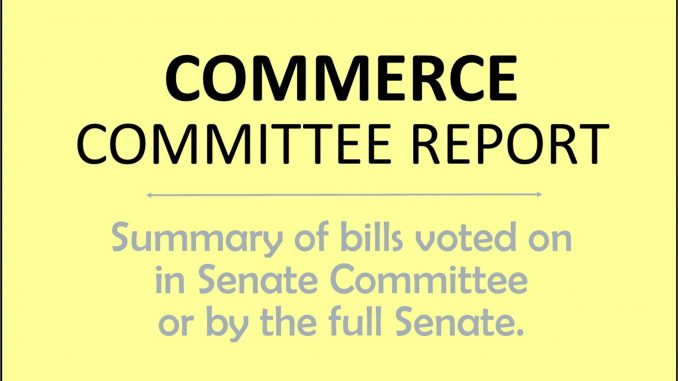
SF 2168 – Foreclosure timeline;
SF 2169 – Alcoholic beverages licensee liability;
SF 2170 – Electronic ‘stop payment’ option;
SF 2172 – Mezzanine loans in life insurance legal reserve;
SF 2177 – CRA security freezes;
SF 2178 – Promotional, pyramid schemes.
COMMITTEE ACTION:
SF 2168 (SSB 3053) shortens the timeframe in foreclosures. The federal Dodd-Frank Act added a 120-day waiting period before a financial institution can start a foreclosure proceeding. Taking that into account, this proposal shortens Iowa’s foreclosure waiting periods (12 months to 6 months, and 6 months to 3 months.) The 3-month waiting period applies to foreclosures where the financial institution agrees to forgive the debt, which is the situation in almost all Iowa foreclosures. The 6-month waiting period applies to the few foreclosure cases where the financial institution has not agreed to waive the debt. Both the 3-month and 6-month wait times do not begin until the 120-day Dodd-Frank waiting period has expired. Even with this legislation, Iowa will continue to have one of the longest foreclosure timeframes in the country. Companion HF 2234 is on the House calendar.
[2/1: short form]
SF 2169 (SSB 1179) limits the liability of an alcoholic beverage license or permit holder for certain alcohol-related injuries, commonly known as Dram Shop. Currently, the holder, regardless of whether the license or permit was issued by the Iowa Alcoholic Beverages Division or by the licensing authority of any other state, is liable to a person for all damages resulting from an intoxicated person if the holder served the alcohol to the intoxicated person when the holder knew or should have known the person was intoxicated, or who sold to and served the person to a point where the holder knew or should have known the person would become intoxicated. Under the bill, damages are available to an innocent third party, and that a license or permit holder is liable only if the establishment sold and served beer, wine or intoxicating liquor directly to the intoxicated person, provided the person was visibly intoxicated at the time of sale or service. The damages available to an innocent third party from a licensee or permittee would be limited to $75,000 for claims involving injury to a person or property, and to $100,000 for claims involving loss of means of support or loss of services, companionship, society or consortium resulting from the death or injury of a person.
[2/1: 9-5 (No: Allen, Boulton, Mathis, McCoy, Petersen; Excused: Bertrand)]
SF 2170 (SSB 3054) is a technical change to allow a person to electronically stop payment on a check. In Iowa, a customer’s “stop payment” order is effective for six months, but lapses if the original order is verbal and not confirmed in writing within 14 days. The stop payment can also be renewed for another six months if the bank receives written notice that the order is effective. Email is included in “written notification.” The bill is supported by the Iowa Bankers Association, Iowa Credit Union League and Community Bankers of Iowa. A companion bill — HF 2171 — is on the House calendar.
[2/1: short form]
SF 2172 (SSB 3056) modifies the maximum value of a life insurance company’s or life insurance association’s investments in CM3 classified mezzanine loans as a percentage of its legal reserve. The bill increases the maximum value of such investments from 2 percent to 3 percent. A companion bill — HF 2175 — is on the House calendar.
[2/1: short form]
SF 2177 (SF 2054) eliminates fees to place, temporarily lift or remove a credit freeze and creates additional methods other than certified mail that credit reporting agencies (CRAs) must accept, including first-class mail, telephone, secure email and secure internet connection. The legislation also shortens the time in which the CRA must take action to put the freeze in place. The Iowa Attorney General strongly supports the proposal, which is similar to legislation in many other states. The bill would take effect upon enactment.
[2/1: short form]
SF 2178 (SSB 3051) defines pyramid or promotional schemes in the consumer frauds section of the Iowa Code. The legislation is brought forward by the national Direct Selling Association, which has lobbied successfully for similar legislation in other states. The Iowa Attorney General’s Consumer Protection Division maintains that existing law is strong and includes the ability to prosecute such schemes under the Iowa Consumer Fraud Act. The Office has successfully applied this law many times in the past and is comfortable with the legal authority already granted, which provides sufficient tools for the Attorney General to go after wrongdoers on the civil side. The Division is concerned that defining a “safe harbor” would potentially hamstring its future prosecution efforts. Instances could come up where businesses appear to be complying with the “letter of the law” but in fact are running a business that is quite harmful to consumers. A companion bill — HF 2172 — is on the House calendar.
[2/1: 10-4 (No: Boulton, Mathis, McCoy, Petersen; Excused: Bertrand)]
